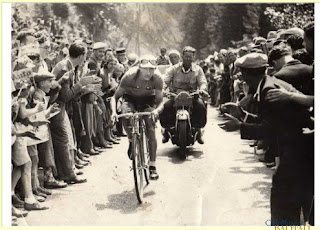
Gino the Pious, Gino iron man, Gino Flying Friar ... These are just some of the nicknames that he knew the Tuscan cyclist, deeply religious and a huge physical and mental strength. He won the Giro d'Italia in 1936, 1937 and 1946, and in 1938 he won, despite being ill, in the Tour de France, a race he won again in 1948, when it was known as the grandfather Gino . Never content to be second and there was no mountain pass could hold him. The break of more than five years in all sports by the Second World War prevented his achievements were much larger. Despite this, he closed his 19-year career with 124 victories in all forms of racing.
But the great Gino, Gino San , hid a secret, secrecy with which he went to the tomb on May 5, 2000 and was discovered three years later by chance, as they discover the important things life. fate would have it in the year 2003 Piero and Simona, the Nissin Giorgi children, a Jewish accountant from Pisa, found his father's diary in which she describes, with a wealth of data and details, rigorous plan of salvation for Jews who devised and run by fascist Italy in the early 40 , in a sort of Italian version of Schindler's List. And on that day appeared unequivocally the name of Gino Bartali, who played a key role in this story.
Who better than a cyclist of his fame, a whole national myth, a proud champion of his country to become the bearer of incriminating documents and false passports? Bartali, who was introduced to the underground network Nissim, the deep Catholic roots, half the roads in Italy making your workouts while on his bicycle had hidden, hidden under the seat or inside the tubes of red and green Legnano, such sensitive documents, thanks to which hundreds of Italian Jews persecuted (an estimated 800) were able to "change identity" and fight the death.

solidarity pedaling
In these long journeys in bicycle-half training and half-made humanitarian mission between 1942 and 1944, the Italian champions took their name visibly written on the jersey for Fascist officials were not tempted to search or arrest. was arrested several times in the routine checkpoints, but almost always managed to convince them that there was nothing odd about walking a bicycle in those roads in the middle of World War . "I have to train to keep fit and able to defend my country in future competitions," he said. At first, his popularity gave him a high degree of indulgence, and often the conversation turns to issues amicably cyclists.
On one occasion, however, was taken to Villa Trieste, as known to the fascist barracks Florence, where be accustomed to harsh interrogations and torture. His attitude on those long rides on the bike and his known proximity to certain Catholic groups had aroused the suspicions of black shirts. "Nobody can prevent me from cycling," Bartali said, who went a few months with their work email illegal. Always said he was obligated to comply with the Christian precept of helping others, even if it meant risking his life in the effort.

Bartali the pious
Born July 18, 1914 in Ponte a Ema, a town near Florence, the young Gino came into the world of cycling by chance. While studying the high school, his father persuaded him to work after classes at the offices a neighbor, Oscar Casamonti, who owns a bicycle business. As payment for his work gave him a bicycle and persuaded him to begin to participate in cycling events, which soon stood with superior physical condition. Educated
very religious, always acted with admirable goodness, who practiced discreetly. Thus, defended Giovanni Valetti, Giro champion in 1938 and 1939 and declared communist, assault by fascists, and even helped him out of jail, where he was sent by his ideas. Always slept with a picture of the Virgin at the head of your bed and built a chapel in her honor. Educated friendly and helpful to everyone, and once answered a reporter who asked him why his behavior: "This will remember me and, when alone in my grave, with all the time to relax, come talk to me so I would not get bored. "
 Coppi-Bartali
Coppi-Bartali
: a duel of legend
In 1940, bursting onto the world scene a young cyclist Fausto Coppi, who won his first Giro running on the same team that set Bartali. Then one starts a rivalry that divides the Italian fans. Veteran against the young, smart and calculating the rider against a whole fury on the bike, the devotee of God of the Christian Democrats voting against the atheist and leftist, the quiet man of blameless life against irreverent debauchery, according to the canons of conservative Italian society at that time. In short, Gino against Fausto Coppi Bartali against an antagonistic duel unparalleled in sports history. They competed for a decade for the same race, the best in the world, staged epic duels at the steepest mountains, were bitter rivals on the road, however, friends outside. Bartali
continued to compete until the end 1953. In that season, at age 39, was still able to win for the fifth time the Tour of Tuscany and the Tour of Reggio-Emilia. But on 15 November of that year, a journey between Milan and Como, was nearly killed when hit by a car while riding her bicycle. The accident was seriously injured in a knee and marked his farewell to professional cycling. He retired with the only bitterness he never won a World Championship.
0 comments:
Post a Comment